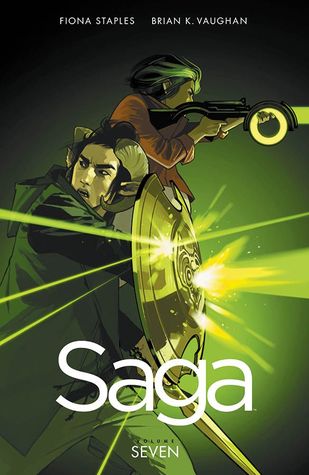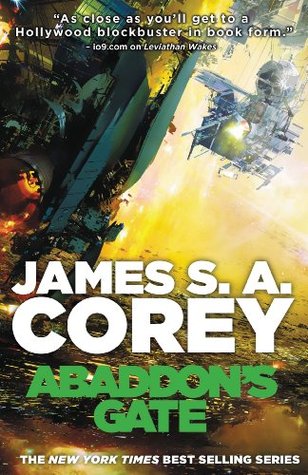
Galactic Center Saga Book #2.
First, a bit of backstory. I actually started this series, not knowing it was a series, back in the 80s. I'd picked up this book through a sci-fi book club as a teen. Upon reading it, I realized that it wasn't a standalone but a sequel. However, there was enough backstory that it didn't matter. But then the ending was left wide open, so I knew that it was, in fact, a series. I was not amused and subsequently forgot about the series for decades. A couple of years ago I stumbled across the first book of the series at a library book sale and decided that I would read the series from start to finish. Review of the first book,
In the Ocean of Night, can be found
here.
Decades have passed since the events that transpired in the first book. The alien wreck on the Moon has been reverse engineered to provide humanity with interstellar flight capability (roughly 0.9c). Earlier, a radio signal had been detected from a world (Isis) orbiting Lalande 21185 (Ra). A hollowed out asteroid, dubbed
Lancer, has been fitted the new technology from the alien wreck (basically a
Bussard Ramjet). Nigel Walmsley, our "hero" from the first book, and his girlfriend, Nikka, have been selected to be on the mission to investigate the source of the radio signal.
Meanwhile on Earth, alien ships have arrived and landed in the oceans, releasing two alien lifeforms, Swarmers and Skimmers. The Swarmers, roughly the size of a great white shark and equipped with sticky proboscises attached to their bellies, are attacking shipping worldwide and, for some reason that I can't fathom, has managed to cripple commerce and stymied the world's navies through headbutts and sticky bio-rope. It's a premise that defies belief. Even if one continues the assumption in the first book that the global economy never recovered from the malaise of the 1970s,
nearly a century has passed in the book's timeline (and this book was written during Reagan's first term). For a species to be able to reverse engineer an alien spacecraft and achieve interstellar flight to not be able to figure out a solution to its global energy crisis and provide for national defense against space sharks is just plain nonsense.
Anyway, back to the plot. Warren is a survivor from one of these attacks. After floating on a makeshift raft for weeks, he manages to make a discovery about the Skimmers that offers some clues about the invaders. Warren is a tough guy to like. While I applauded his exceptional resourcefulness (if more people were like him...sorry, going off topic again), he could be a bit of a jerk. It took me a while before I could root for him to succeed.
Back in space, Nigel and Nikka struggle with the most petty onboard ship politics and relationships (I hope this is the last of Benford's books with three-person relationships. It smacks of wish fulfillment.). Much is learned about the aliens on Isis, but mysteries remain. Nigel argues that based on their discoveries here, the Moon, and his encounters with alien craft back home, that there is an malevolent alien intelligence afoot. But since the guy's an arrogant jerk, people don't want to believe him.
Lancer is run as a democratic socialist state with one elected leader, Ted, who calls the shots with input from section chiefs. Ted thinks that Nigel wants to run things and blocks him whenever he can justify it. Benford is clearly no fan of this command structure, writing:
It took a week to reach a shipwide consensus, then another to plan the raid.
Could you ever imagine that happening in
Star Trek?
There's even more wrong with this book. For instance, whenever Nigel listens in to the shipwide communications channel, we get all of the voices coming at once without any real designation of who's talking. It's like being at a party and attempting to listen to every conversation at once with everyone talking over one another. While Nigel is supposed to be able to follow it because his mind was "touched by an alien" in the first book, we poor readers are stuck with pages of babble, presented in italics without punctuation or speaker identification. And for a group of people that are supposed to be among the best and brightest, they come across as so much rabble, thumping their chests in proud ignorance.
Benford also gives an inordinate amount of time to on-demand sex changes. I wonder what transgender folks think of his approach. Is he flippant for making it something done on a whim, or is he progressive for this society's attitude that it's not a big deal. Both Nigel and Warren have to deal with others who have gone through the change. In neither case does it advance the plot, but rather it serves to further alienate the men from their fellow humans. And neither transgendered person comes across better for it, merely petty. I think I have my answer.
The original ending to the book was the worst sort of cliffhanger. There was no sense of direction and far too much unresolved. Ten pages were added to the paperback edition (which I somehow seem to have acquired). There was enough there to resolve events that transpired in this book and offer a way forward for the series. It changed the tone of the story. Even Nigel managed to lead by example, rather than just being a curmudgeon.
So what's good here? Well, there are kernels of good plots here with the protagonists attempting to figure out who is responsible for the turmoil they're seeing. The world building is great, both scientifically plausible (ignoring the space sharks) and interesting. And the malevolent alien intelligence that takes shape promises to be a worthy villain for the series. Benford is a physicist, having had his Ph.D fifteen years before writing this book, and continued working in the field up until 2006.
2.5 stars.
\_/
DED
 John Carter is out in the American West of the 1880s and, while being chased by bloodthirsty Indians (paraphrasing his description), stumbles into a cave whereupon he's mysteriously teleported to Mars, or Barsoom as the locals call it. He proceeds to have swashbuckling adventures as the planet's lower gravity gives him amazing strength and agility.
John Carter is out in the American West of the 1880s and, while being chased by bloodthirsty Indians (paraphrasing his description), stumbles into a cave whereupon he's mysteriously teleported to Mars, or Barsoom as the locals call it. He proceeds to have swashbuckling adventures as the planet's lower gravity gives him amazing strength and agility.
 Don't let the title fool you. This book is about far more than that. It covers Reagan's adversarial relationship with the former Soviet Union and communism. There's quite a bit of background biography to explain how Reagan came to be the hardliner he was. It highlights the big four speeches he gave and the summits with Gorbachev.
Don't let the title fool you. This book is about far more than that. It covers Reagan's adversarial relationship with the former Soviet Union and communism. There's quite a bit of background biography to explain how Reagan came to be the hardliner he was. It highlights the big four speeches he gave and the summits with Gorbachev.
 Galactic Center Saga Book #2.
Galactic Center Saga Book #2. While en route to reunite Sir Robot IV (no longer a prince) with his son, the treeship has run out of fuel and makes an emergency stop on the war torn world of Phang. In previous issues, Phang has always been referred to as a terrible place. Sophie, who was a child when she was sold as a sex slave, was orphaned on Phang. Marko's unit had a rotation there. So it was with some trepidation that the ship touched down, though it was in a ruined city far from the front lines. They soon meet a tribe of simple meerkat-like people who lived among the ruins and spend the next six months taking care of them, making food for all these mouths greatly slows down the refueling process.
While en route to reunite Sir Robot IV (no longer a prince) with his son, the treeship has run out of fuel and makes an emergency stop on the war torn world of Phang. In previous issues, Phang has always been referred to as a terrible place. Sophie, who was a child when she was sold as a sex slave, was orphaned on Phang. Marko's unit had a rotation there. So it was with some trepidation that the ship touched down, though it was in a ruined city far from the front lines. They soon meet a tribe of simple meerkat-like people who lived among the ruins and spend the next six months taking care of them, making food for all these mouths greatly slows down the refueling process.
 For generations, the solar system - Mars, the Moon, the Asteroid Belt - was humanity's great frontier. Until now. The alien artifact working through its program under the clouds of Venus has emerged to build a massive structure outside the orbit of Uranus: a gate that leads into a starless dark.
For generations, the solar system - Mars, the Moon, the Asteroid Belt - was humanity's great frontier. Until now. The alien artifact working through its program under the clouds of Venus has emerged to build a massive structure outside the orbit of Uranus: a gate that leads into a starless dark.
 I got this book for my daughter this Christmas. I'd checked out a couple of the cartoons and thought that it was a match for her. And, it seemed like I could read it, too, and then we could talk about it. Bonding with my daughter over a book. How cool is that?
I got this book for my daughter this Christmas. I'd checked out a couple of the cartoons and thought that it was a match for her. And, it seemed like I could read it, too, and then we could talk about it. Bonding with my daughter over a book. How cool is that?
 Bruce Dickinson is best known for his role as the lead singer for Iron Maiden, but fans know that he's accomplished so much more than that. World-class fencer, commercial airline pilot, novelist, radio presenter, scriptwriter, beer brewer are just some of the occupations outside of music that the man has pursued through the years. This memoir explores the passions of a man with an insatiable curiosity.
Bruce Dickinson is best known for his role as the lead singer for Iron Maiden, but fans know that he's accomplished so much more than that. World-class fencer, commercial airline pilot, novelist, radio presenter, scriptwriter, beer brewer are just some of the occupations outside of music that the man has pursued through the years. This memoir explores the passions of a man with an insatiable curiosity.